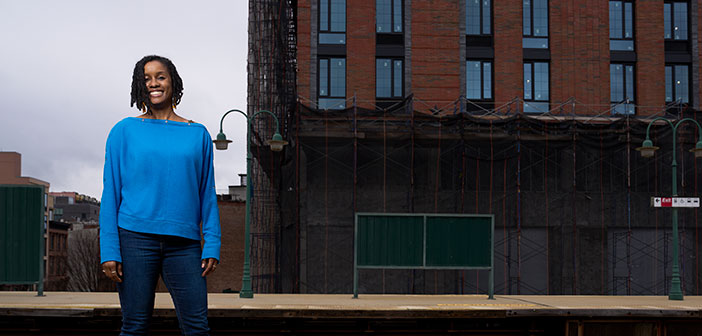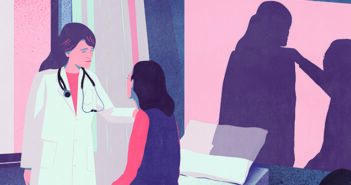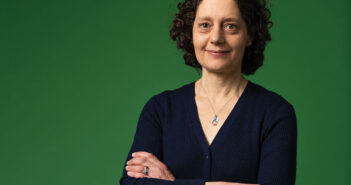She has the skills to fight the ills.
Last fall, Makini Chisolm-Straker ’05 MD’09, MPH, began her term as a 2022-2023 White House Fellow. For most young professionals, the appointment would be the pinnacle of their career. For Chisolm-Straker, an emergency physician, researcher, and anti-trafficking advocate, it was the logical next step. It wasn’t even the first time the White House had called her.
When Chisolm-Straker was a global emergency medicine fellow at Columbia, the Obama administration invited her to join a working group on human trafficking. But it conflicted with an assignment in Rwanda, so she declined.
Fellowship director Rachel Moresky ’91, MD, MPH, remembers her astonishment when she learned, too late, what her trainee had passed up. “That speaks to her integrity,” Moresky says. “When she committed, she committed—even if there was something else that might have furthered her career, that was more prestigious.”
Before she decided to become a doctor, Chisolm-Straker, who’s from Brooklyn, NY, wanted to be a teacher. “Then I realized how much work that was,” she says. “Thirty kids in a classroom!” Her father, a physician assistant, encouraged her to do an eight-year program, which led her to Brown and the PLME.
She met Iris Chung ’05 in the Third World Transition Program for incoming students. They later served as minority peer counselors and shared a passion for supporting students of color. “She’s always been an advocate for and defender of vulnerable populations and marginalized communities,” Chung says of her former roommate, who would regularly urge her friends to get involved as well.
In her first semester of medical school, Chisolm-Straker attended a talk by Katherine Chon ’02, cofounder of the anti-trafficking organization Polaris, who told them doctors see patients who are trafficked and don’t realize it—especially in emergency departments. Chisolm-Straker asked Chon, “What can we do, if we’re missing your clients?” Chon replied, “You should teach your colleagues.”
Chisolm-Straker learned to teach after all, alongside her medical studies. She listened to survivors, attended conferences about trafficking, and developed a curriculum. Hospital mentors wrangled colleagues to hear her presentation. “At first they were like, oh, that’s cute, what is this little med student going to teach us?” Chisolm-Straker laughs. “And by the end, they were like, wait a minute. I think I saw a patient like that.”
In those days the anti-trafficking movement was led mostly by law enforcement, and there wasn’t much medical scholarship on the topic. “It felt very lonely,” Chisolm-Straker says. But through her research she found like-minded clinicians around the country, and in 2013 they formed HEAL Trafficking, to train healthcare professionals to recognize and care for potential survivors.
“Our job is always high-quality health care first,” Chisolm-Straker says. While physicians must report suspected abuse of minors, calling unwelcome law enforcement can cause more harm. “What we bring to our patients is a safe space, no matter what happens,” she says. Doctors can’t “find the bad guys,” she reminds colleagues. “You’re not Liam Neeson. Calm down.”
Throughout her academic career, Chisolm-Straker, an associate professor at Icahn School of Medicine, has focused her research on invisible populations, such as trafficking survivors and trans patients. She realized that what many of them need—more than what she could offer as a doctor—was the help of a social worker like her mother, to access housing, healthy food, a living wage. “It’s domestic policies…that actually maintain health,” Chisolm-Straker says.
Believing she would “be more useful” setting policy than doing research, she called her old friend and colleague Craig Spencer, MD, MPH, an associate professor of the practice of health services, policy, and practice at Brown’s School of Public Health, for career advice. “We talked about different options,” he recalls. A few months later, she told him she’d gotten the White House Fellowship.
“Nothing about that surprised me because that’s just who she is,” Spencer says, chuckling. “She doesn’t care about the laurels. … She knows that this is where policy happens.”
Moresky, who sent Chisolm-Straker into conflict zones during her Columbia fellowship, says, “She always wanted to be a little bit uncomfortable … to make sure she grew.” Moresky and Spencer both describe her as direct and unafraid to mince words, while also compassionate, thoughtful, and humble. “She could head an entire agency,” Moresky adds.
Chisolm-Straker is serving at the Social Security Administration, leading a study to collect primary data on structural contributors to disability and working with a paid advisory group whose members are disability experts with lived experiece. She plans to work in policy after the fellowship, while continuing to practice. “I still like listening to patient stories,” she says. “It connects me to the people who are not the talking heads.”
While Chisolm-Straker loves exploring these issues with her friends (“We’re all talking heads,” she acknowledges), they also share passions for exercise, food, and binge-watching TV. “She’s an incredibly wonderful and balanced person,” Spencer says, who bonded with her in the eastern Congo over shared workouts. A rugby player since her time at Brown, Chisolm-Straker also kickboxes, volunteers at animal shelters, and—since Black Panther came out—goes to Comic-Con every year, “as Okoye in full cosplay,” she says. “It is full dorkdom.”
“She’s so knowledgeable and aware of what’s happening in the world. But, I’m telling you, she loves a good BuzzFeed quiz,” Chung says. Recalling how Chisolm-Straker slept on the floor of an airport to get to Chung’s wedding on time, she adds, “She’s there through thick and thin. … The qualities that make her a super talented and gifted doctor also make her an incredible friend.”




